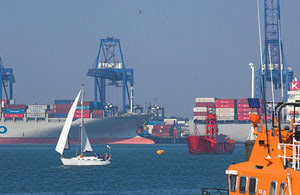Government doubles trainee funding in SMarT move to boost UK maritime sector

Doubling support to £30 million a year will enable the annual intake of SMarT cadets to rise from 750 to 1,200.
More than 400 extra cadets will be trained in maritime roles every year thanks to a £15 million funding boost announced by Maritime Minister Nusrat Ghani today (2 February 2018).
The investment, which will double the support for young people to £30 million a year, will be offered through Support for Maritime Training (SMarT), enabling the annual intake of cadets to rise from 750 to 1,200.
Multinational shipping companies, including Carnival UK, BP, Shell, Maersk and Stena Line, have also pledged to create an extra 450 training positions on board ships.
These positions will give SMarT cadets the experience at sea that will help them gain internationally recognised qualifications, setting them in good stead for future careers both within and outside the sector.
This commitment comes shortly after the launch of the Year of Engineering, a campaign to show young people from all backgrounds the variety and opportunities an engineering career can bring.
Maritime Minister Nusrat Ghani said:
We are building the maritime workforce of tomorrow and I want to encourage more young people to consider an exciting and rewarding career at sea.
By doubling the funding for cadet training, we will help make sure that our engineers and captains of the future can access the right opportunities to reach their full potential.
It will also strengthen the UK maritime sector’s position as a world leader and ensure people have the skills they need to help the industry flourish after we leave the EU.
Shipping and ports are critical to supplying the UK’s daily needs, with around 95% of imports and exports coming by sea, including 40% of our food and at least a quarter of our energy.
By supporting young people wanting to get into maritime, we will boost a growing sector, ensuring that the UK remains the first port of call for shipping companies seeking highly skilled officers.
UK Chamber of Shipping Chief Executive Guy Platten said:
Nothing will prove that the UK is open for business quite like seeing more British seafarers arrive in the world’s ports. We already recruit people from all backgrounds and all corners of the country, and with this new investment we will be able to create thousands of new opportunities in the years ahead.
The taxpayer sees a £5 return on every £1 it invests in seafarer training, so this funding will see the economy and the workforce, as well as the industry better off.
Seafarers are highly skilled and well paid, and have the opportunity to build a successful long-term career. We know this funding will help us to unlock the talents of more young people, and it goes to show what can be achieved when government and industry work together.
The training places are open to anyone across the UK who has an interest in becoming a navigation officer, engineer or an electro-technical officer.
Places will be available at training colleges including Warsash Maritime Academy in Southampton, City of Glasgow College, Lairdside Maritime Centre in Liverpool, South Shields Marine School and the Fleetwood Nautical Campus.
Emma Jordan, 27, is taking a foundation degree in marine engineering at Warsash Maritime Academy. She said:
I was a motorbike mechanic before but I discovered a more challenging role with BP Maritime Services. I’d really like to be a chief engineer and the guys on board are really good as they’re really interested in your training because if they do it right then you’re going to be useful.
The funding will increase annually over 7 years to fulfill demand for seafarer training.
The maritime industry has a crucial role to play in inspiring the next generation of engineers throughout 2018. The government’s Year of Engineering is being supported by organisations from across the industry, including the Royal Navy, UK Nest, Seafarers UK, the Maritime and Coastguard Agency, Land Rover BAR and Associated British Ports.











Responses